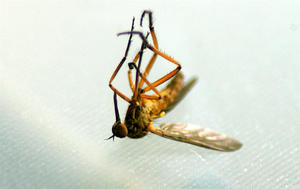Infectious diseaseMosquitoes' last supper
Inhibiting a molecular process cells use to direct proteins to their proper destinations causes more than 90 percent of affected mosquitoes to die within forty-eight hours of blood feeding; the approach could be used as an additional strategy in the worldwide effort to curb mosquito-borne diseases like dengue fever, yellow fever, and malaria

The best way to stem the spread of mosquito-borne disease // Source: treehugger.com
Mosquitoes die soon after a blood meal if certain protein components are experimentally disrupted, a team of biochemists at the University of Arizona has discovered.
The approach could be used as an additional strategy in the worldwide effort to curb mosquito-borne diseases like dengue fever, yellow fever, and malaria.
When the researchers blocked a cellular process known as vesicle transport, on which the mosquitoes rely to release digestive enzymes into the gut among other functions, it caused the affected animals to die within two days of blood feeding.
“The idea behind our research is this: If we can kill the mosquito after she bites the first person, she won’t be able to bite and infect a second,” said Roger Miesfeld, a professor in the UA’s department of chemistry and biochemistry, who led the research project.
“We do this by blocking the mosquito’s ability to digest its blood meal,” said Miesfeld, also a member of the UA’s BIO5 Institute.
A University of Arizona release reports that the research team’s findings were recently published in Proceedings of the National Academy of Sciences (PNAS). The project was supported by grants from the National Institute of Allergy and Infectious Disease at the National Institutes of Health.
“During a blood meal, a mosquito ingests its body weight in blood. It’s the equivalent of a 125-pound human consuming a 12-gallon smoothie made from 25 pounds of hamburger meat plus a half pound of butter and two tablespoons of sugar,” Miesfeld said.
Miesfeld and the research team had previously shown that the blood feeding process poses a huge metabolic challenge to the female mosquito.
“By disrupting any number of biochemical processes needed to fully utilize the blood meal, the mosquito has a very difficult time completing the egg production cycle,” he added.
To maintain their bodily needs, the insects rely on sugary nectar from flowers, but when the time to make eggs comes, they need large amounts of protein. Only female mosquitoes bite and feed on the blood of humans or warm-blooded animals.
If a mosquito finds enough victims to bite and avoids being squashed, it can live as long as three weeks. During that time, it may lay up to five clutches of more than 100 eggs each.
The release notes that these mosquitoes are now found in many parts
